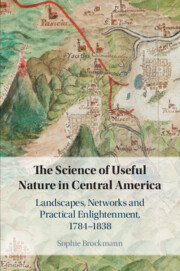 The Science of Useful Nature in Central America
The Science of Useful Nature in Central America Book contents
- The Science of Useful Nature in Central America
- The Science of Useful Nature in Central America
- Copyright page
- Dedication
- Contents
- Figures
- Acknowledgements
- Notes on Translations and Names
- Abbreviations and Acronyms
- Additional material
- Introduction: A Kingdom of Vast Extension
- 1 Landscape, Ruins, and Governance
- 2 Networks of Knowledge and Action
- 3 Making Enlightenment Local
- 4 Useful Geography in Practice
- 5 Transforming Environments
- 6 Independence and Useful Nature
- Conclusions
- Glossary of Colonial Administrative Terms
- Bibliography
- Index
Conclusions
Published online by Cambridge University Press: 27 August 2020
- The Science of Useful Nature in Central America
- The Science of Useful Nature in Central America
- Copyright page
- Dedication
- Contents
- Figures
- Acknowledgements
- Notes on Translations and Names
- Abbreviations and Acronyms
- Additional material
- Introduction: A Kingdom of Vast Extension
- 1 Landscape, Ruins, and Governance
- 2 Networks of Knowledge and Action
- 3 Making Enlightenment Local
- 4 Useful Geography in Practice
- 5 Transforming Environments
- 6 Independence and Useful Nature
- Conclusions
- Glossary of Colonial Administrative Terms
- Bibliography
- Index
Summary
Looking at the country they sought to reform, the self-proclaimed enlightened enthusiasts of Central America saw all sorts of ruins: archaeological sites, the remains of the old city of Antigua as a background against which the new capital of Nueva Guatemala was built, fields destroyed by locusts, the decline of indigo exports, and roads covered by mudslides. The eruption of a volcano might emit sufficient fire to resemble ‘the mouth of hell’, while rivers were so difficult to navigate that European standards of engineering did not apply. Yet enlightened approaches to science and ‘useful knowledge’ promised to bring change to Guatemala, in the sense of material improvement as well as in the paternalistic sense of an ordered, ‘moral’ society that started with a controlled landscape. A new focus on nature arose simultaneously from the Bourbon Reforms’ emphasis on natural resources, and the emergence of new patriotic discourses about land in Spanish America.
- Type
- Chapter
- Information
- The Science of Useful Nature in Central AmericaLandscapes, Networks and Practical Enlightenment, 1784–1838, pp. 230 - 234Publisher: Cambridge University PressPrint publication year: 2020
